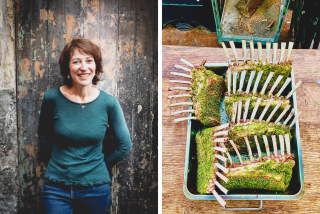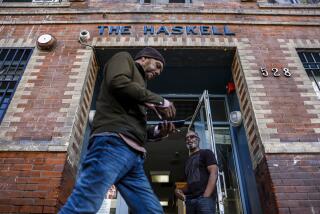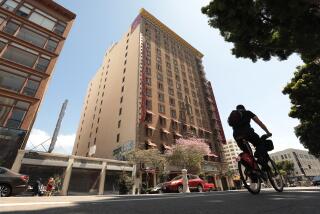London down the rabbit hole: Two hotels, two city views
“If you want to sleep through to breakfast, fasten your seat belt over your blanket now,” said Liana, the flight attendant, refilling my water bottle. “If we experience turbulence over Greenland, you have to b...,” she said, her voice fading away. But I was already half-asleep.
The next thing I remember was climbing into a taxi and telling the driver to go to Knightsbridge. Somewhere along the way, I fell down Alice’s rabbit hole and landed in Victorian London, waking up in a 126-year-old, red-brick row house at 11 Cadogan Gardens, in Chelsea.
But my fourth floor digs weren’t the drafty garret you’d expect a writer to occupy. Real starving artists, writers of socialist tracts or poetry for the ages, may have found inspiration in cold rooms and bowls of gruel. And that’s not me. Nor was it the style at either of the two hotels I stayed at last April, the Rosewood Hotel, on High Holborn, and 11 Cadogan Gardens, near Sloane Square.
In some towns and for some travelers, a hotel is just a bed. But not in this ancient capital, a city of a dozen distinct neighborhoods. The hotel where you eat breakfast, catch up on emails, write postcards and linger over an after-dinner brandy will reflect its history. And some will stick to you, too.
At 11 Cadogan Gardens, a 54-room boutique hotel, Victorian sensibilities reign. Built in 1888, the heyday of the British Empire, the hotel had been updated now and again. But it remains so determinedly low-profile that except for the occasional reporter’s leak, the guest list depends on word of mouth. The red-haired charmer in the adjacent suite could be an Oscar winner or a rich widow. The man with the moustache: a Disney animator or a corporate tycoon.
“We’re quite popular with novelists,” said John, in reception. “But they’re just a private guest when they’re here with us.”
My two-room retreat literally breathed Empire at its best. The high ceilings, the decorative moldings and the wobbly doors were original, as were the sash windows, easy to open when you needed a breath of air. The bathroom was definitely old-school with a tub big enough for two. Area rugs hid some of the floor’s creaky, black-painted boards, nicked here and there, as bare floors always are.
But newer than tomorrow were the creature comforts: patterned wing chairs, a plump canopy bed with a new mattress, satin quilts, cotton sheets and feather pillows. The color scheme, a contemporary decorator’s choice, ran from soft grey and pale brown to silver and black, with billowy drapes, mirrored closet doors and a sofa and chairs to match. What would Queen Victoria think, I wondered, inspecting the bright lights, the television, the safe and the internet access.
Beyond the window, green tree branches filtered the sunlight speckling the gated and fenced garden below a private space for residents only. A resident myself, for the duration, I sat on a bench under a cherry tree, sketched the scene and watched a couple of laughing children toss a ball.
With dusty portraits climbing the stairwell and a library full of leather-bound tomes, there was much to see. At 8 p.m. I dined in the hotel’s cellar restaurant, where the menu offered fresh English ingredients prepared with an Italian-Asian flair. I wasn’t the only one the chef impressed; by 9, the maitre d’ was turning away patrons who’d neglected to make reservations.
Queen Victoria shadowed me as I visited her former haunts: Kensington Palace where she was raised; and Buckingham Palace, where she watched the Changing of the Guards from the window. I watched it from outside the fence.
She came to mind as I explored the Victoria and Albert Museum’s eclectic collections. From glassware to ceramics and fabrics to tile; from Greek and Roman statuary to Renaissance “cartoons,” the V&A had it all.
Why was the bust made from Henry VII’s death mask on display? A tribute to Tudor history, perhaps. How surprising it was that he looked nothing like the portraits of his famous son, Henry VIII.
The next day, I moved to the Rosewood Hotel, in a seven-story, Grade II-listed, “Belle Epoque” building on High Holborn, and found myself in a different, older London. The neighborhood, “The City,” predates the Victorian West End and is closer to Westminster Abbey, Covent Garden and the theater district, and to the Inns of Court.
The building itself is newer, built in 1914 for an insurance company. But after a $144 million restoration and renovation, the magnificent Edwardian-Palladian facade and 116-foot cupola are a perfect fit for the Rosewood Hotel group’s brand of luxury.
As taken as I was with the gated entrance and inner courtyard, I was even more impressed with the contemporary design inside the hotel, especially on the ground floor, where glass and brass combine for a burst of luminosity. Transparent and translucent panels replace solid walls and are used for partitions and passageways. Glass enhances indirect light, glitters from chandeliers and warms backlit display shelves for objets d’arts.
The Holborn Dining room, an upscale Brasserie, lively and bright, is already a neighborhood favorite for lunch and dinner. Serving traditional British dishes, the chef relies on fresh and farm-to-table meats, cheeses, and vegetables, turning tired recipes into exciting new dishes. I spent a lively evening here dining on rare roast beef, and, between courses, deconstructing the menu with a friendly waiter.
“This used to be the insurance company’s East Banking Hall,” he told me, after describing the “charcuterie board” and the “Cornish slip soles.” “Huge, isn’t it?” he went on, waving a hand at the scattering of oak tables and chairs, and at the rows of red, leather-upholstered booths near the bar.
Poking around on west side of the building, I found the Lobby Lounge, a clubby kind of room with walls of bookcases, sofas and wing chairs, an extensive, mirror-backed bar and a banquet size fireplace.
The decor in my second-floor studio suite one of 262 guest rooms and 44 suites was a lesson in minimalism done right. The colors were neutral but warm; the chairs simple but sleek; the tables plain but well-built, and the enormous bathroom, functional but lavish, all mirrors and marble. Small stacks of coffee table books, photo collections and atlases sat on several tables, an instant invitation to any reader.
I didn’t see the hotel’s largest suite, the six-bedroom Grand Manor House Wing, with 6,318 square feet of space and a private elevator for access. It comes with a personal butler, a concierge, and cocktail and snack menu. Now that’s my style. The next time I’m in London with 25 friends, I’ll see if it’s down the rabbit hole.
(c)2014 McClatchy-Tribune News Service
Distributed by MCT Information Services
PHOTOS (from MCT Photo Service, 202-383-6099):
WLT-LONDON-HOTELS
More to Read
Sign up for The Wild
We’ll help you find the best places to hike, bike and run, as well as the perfect silent spots for meditation and yoga.
You may occasionally receive promotional content from the Los Angeles Times.






